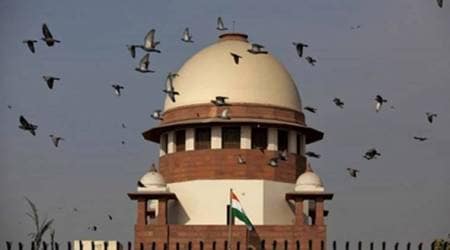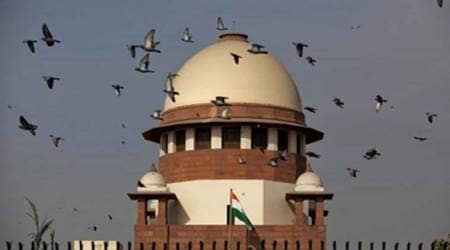 Shefin Jahan with Hadiya (Akhila). (File)
Shefin Jahan with Hadiya (Akhila). (File)
The Supreme Court on Wednesday directed the National Investigative Agency to probe into the case of annulment of marriage between a Muslim man and a Hindu woman (who had converted into Islam) by the Kerala High Court who described the case as ‘love jihad.’
The apex court has also ordered that the probe will be carried under the supervision of the retired apex court Judge R V Raveendran. The bench headed by Chief Justice J S Khehar said it will take a view after considering the NIA’s probe report, inputs from the Kerala Police and after talking to the woman involved in the case.
The bench’s order came after Kerala-based 27 years old Muslim man Shafin Jahan challenged the annulment of his marriage to Akhila alias Hadiya by the Kerala High Court on May 24.
Here is what has happened till now in the case
24-years-old Hadiya, who was staying with her friends in Malappuram, married Jahan on December 19 last year. Both were introduced to each other through a Muslim matrimonial website in August 2016. Two days after their wedding, Hadiya was asked to appear before the court in a habeas corpus petition filed by her parents. Her parents approached the High Court alleging forceful conversion.
Hadiya, however, while appearing in the court said that she had converted to Islam on her own. Her father, K M Ashokan, an ex-serviceman, however alleged that there was a “well-oiled systematic mechanism” for conversion and and that the marriage was an attempt to make her a part of the Islamic state. The marriage happened while the petition was pending in the court.
Following this, Kerala High Court then sent her to a hostel in Kochi. The court proceedings continued normally but Hadiya was not allowed to meet anyone. Jahan, who had been working in Muscat had to quit his job to take part in the proceedings. “My company told me to return to the Gulf only after settling the matter,” he said. Read: As man fights ‘Islamic State’ taint for wife, police at her door, in her room. Click here
Meanwhile, the high court had directed the police to probe the matter. During the investigation, the police found no evidence that could link Jahan with any criminal activity. The report however, mentioned that Jahan had been the admin of a WhatsApp group called ‘SPDI Keralam’. He was also in another group called ‘Thanal.’ Mansy Buraqui, who was arrested in connection with the Islamic state module, was also a member of the two mentioned groups. In his defence, Jahan said that Buraqui was removed from the groups soon after his support for the Islamic State was revealed. He also said that he had no other connection with Buraqui except being connected with him on the groups.
After this, the Kerala High Court in its judgement while declaring the marriage void said, “Marriage being the most important decision in her (Akhila)’s life can only be taken with the active involvement of her parents…The marriage, which is alleged to have taken place, is a sham and is of no consequence in the eye of law. Her husband has no authority to act as the guardian.” Read: For The record: ‘It is absolutely unsafe to let (24-year-old) be free to do as she likes’. Click here
The court then granted Hadiya’s custody to the father and also directed the Kottayam district police superintendent to provide them protection. Reports suggest that Hadiya was not happy with the decision. “I am a 25-year-old Indian citizen. Why the court put me under house arrest for the last five months? Why the court denied me the right to live as per my faith and likes?’’ she asked in a letter released to the media in May.
Jahan, in the meantime, decided to challenge the judgement and approached the Supreme Court. The apex court then directed the state police to share its investigation reports with the National Investigation Agency. The NIA’s involvement is necessary to ascertain if this is really an isolated case or is there something more… something wider…,” the bench said. Jahan, was reportedly unhappy with the involvement of NIA, saying that it amounted to distrusting the police. The Supreme Court, however, rejected his claims and said that the “purpose of issuing notice to NIA on the first day itself was for neutral and unbiased assistance”.
Jahan, meanwhile, has not been able to connect with Hadiya. “I had sent a letter to her, but her father returned it with the acknowledgement ‘rejected by the guardian’. Once I went to TV Puram to visit her, but police did not allow me to enter the house.” Jahan also added that as an Hadiya who is an adult has every right to practice a religion of her choice. “By confining her within the house, her family is now attempting a forced conversion. That is why Hadiya is not allowed to speak. She is still my wife,” he said while speaking to The Indian Express.
A police officer in Kottayam rejected calling it house arrest and said, “We have intelligence reports that the woman and her parents face serious threat from Islamic fundamentalists. We have advised the family not to let the woman outside as it may endanger her life.”
Hadiya’s father, meanwhile said he will talk only after the Supreme Court delivers its verdict. In a breaking voice, he said, “I am fighting for the custody of my only daughter. I won’t allow anyone to meet her.”

